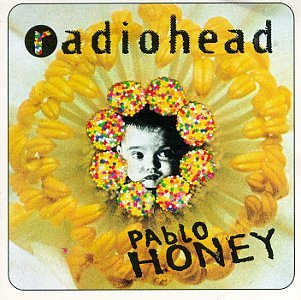
“Pablo Honey” Was Radiohead's Debut Album. Issued In 1993, The Album Was Named After A Popular Prank Call By The Jerky Boys (This Prank Call Is Sampled On The Song “How Do You”).
“Pablo Honey” was Radiohead’s debut album. It was issued in 1993, and I think you more or less know the story: its leadoff single (“Creep”, a marvelous exploration of self-hatred) was blacklisted for being just too depressing. Yet, by a bizarre twist of fate the song began being played in Israel. Then, some import copies found their way into San Francisco. From there, nothing would stop the five friends from Oxfordshire, and England had to listen to what Yorke and his cohorts were screaming at the top of their voices.
Because “Pablo Honey” was the closest the band came to grunge. The material on this disc has serious difficulty sitting next to the songs from just any other Radiohead album. For example, Parlophone’s single disc compilation (released in 2008) included only the ineluctable “Creep”. And the enhanced two-CD edition had “You” and “Anyone Can Play Guitar” tucked near the end of the second disc, as if the songs had been added hastily to the tracklist when the compilers realized the band’s debut had been absolutely neglected.
The truth is that there is nothing wrong with “Pablo Honey”… leaving aside that it is a “conventional” album from a band that was to become renowned from its unwavering experimentation and inventiveness. Radiohead was to sound like nobody else on the industry. Yet, on “Pablo Honey” they did bring to mind other acts.
Of course, Nirvana was the first band one made an association with. Radiohead was actually dubbed “the British Nirvana” once “Pablo Honey” hit the high streets. And they were also mocked as “Nirvalite”, which might go into explaining why the band felt ill at ease about performing songs from their debut album live on later tours. Even the successful “Creep” was given a wide berth, much to the chagrin of audiences that (along with “Karma Police”) invariably thought of that song when the name of the band was mentioned.
Echoes of The Smiths, The Cure and U2 were also evident throughout. “Anyone Can Play Guitar” had it all, with an anthemic, double-time chorus and its microcosmic approach to success.
Besides, Yorke came with some really fine ruminations on teenage angst in the shape of “Stop Whispering” (which was rightfully released as a single), “Lurgee” and “I Can’t”. Morrissey took a similar stance on classic Smiths’ numbers like “What Difference Does It Make?” and “Still Ill”. And while no-one could beat the Mozzer at navel-gazing, Yorke’s forays benefited from the caterwaul that came from having three guitarists on the band. The best-loved songs on the album all did, actually – the almighty racket at the start of “Anyone Can Play Guitar” was every bit as memorable as the song’s refrain, and “Creep” was to be described as a guitar carnage. Which is quite apt, really – Johnny Greenwood was actually trying to ruin a song he did not like by getting really dense with his instrument.
On the other hand, “Thinking About You” was one of the few acoustic links of the record, and the song was covered by the Uruguayan band El Fuerte Punto Baz in 2006 on their album “Nombrame Siempre” – an album I really should get down to reviewing one day. It is one of the gutsier, harder-hitting Uruguayan albums I have in my collection.
Coming back to our good British friends, now, “Pablo Honey” also included reworked versions of some of their earliest songs – a time in which the band was known as “On A Friday”. These included “Prove Yourself” and “You”, songs that basically represented the band’s peak as an unsigned outfit. Along with “Thinking About You”, both compositions had surfaced as early as “Drill”, the band’s first set of demo recordings.
When all is said and done, “Pablo Honey” could be deemed as a successful album inasmuch it gave critics the impression that Radiohead was the kind of band to evolve siderally as it went along. By that reckoning, “Pablo Honey” will always be a good disc. Yet, whether you would like to listen to a good disc when the band was to release some of the most groundbreaking works of the decade is entirely up to you.
Rating: 7/10

Pingback: Radiohead – General Introduction | MusicKO
Pingback: Month In Review – November 2010 | MusicKO
Pingback: Guitaryst – Play Your Guitar With The Help Of Automatic Tabs | MusicKO
Pingback: The Bends (Radiohead) – Album Review | MusicKO